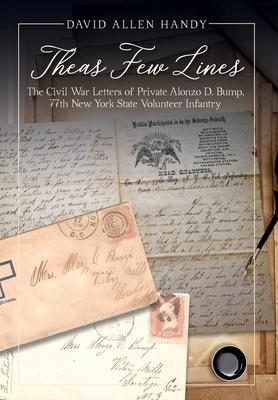Theas Few Lines is a rich account of the experience of an upstate New Yorker who left home to fight for the Union during the American Civil War. Alonzo D. Bump lived in the thriving small cotton mill town of Victory Mills, the home of the Saratoga Victory Manufacturing Company where he was employed as a weaver. With the desire to "go down to see the world," Alonzo left behind Mary, his wife, and his three-year-old daughter, Mattie. Private Bump's letters were largely written to Mary, though a small few were sent to his mother, sister, mother-in-law, and his two sisters-in-law. His letters reveal a deep love shared with Mary. For Alonzo, composing letters served as the primary instrument whereby he maintained his emotional ties with Mary and had a powerful therapeutic benefit for the married couple. Exchanging letters helped to mollify the geographic distance between Alonzo and Mary. He wrote about camp life, poor rations, disease, marching, combat, desertion, commanding officers, the enemy, military pay, sex, prostitution, pornography, and African Americans. The reader will come away with a deeper understanding of the common soldier's experience during the Civil War.

Theas Few Lines: The Civil War Letters of Private Alonzo D. Bump, 77th New York State Volunteer Infantry
Theas Few Lines is a rich account of the experience of an upstate New Yorker who left home to fight for the Union during the American Civil War. Alonzo D. Bump lived in the thriving small cotton mill town of Victory Mills, the home of the Saratoga Victory Manufacturing Company where he was employed as a weaver. With the desire to "go down to see the world," Alonzo left behind Mary, his wife, and his three-year-old daughter, Mattie. Private Bump's letters were largely written to Mary, though a small few were sent to his mother, sister, mother-in-law, and his two sisters-in-law. His letters reveal a deep love shared with Mary. For Alonzo, composing letters served as the primary instrument whereby he maintained his emotional ties with Mary and had a powerful therapeutic benefit for the married couple. Exchanging letters helped to mollify the geographic distance between Alonzo and Mary. He wrote about camp life, poor rations, disease, marching, combat, desertion, commanding officers, the enemy, military pay, sex, prostitution, pornography, and African Americans. The reader will come away with a deeper understanding of the common soldier's experience during the Civil War.